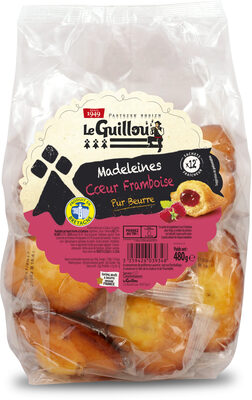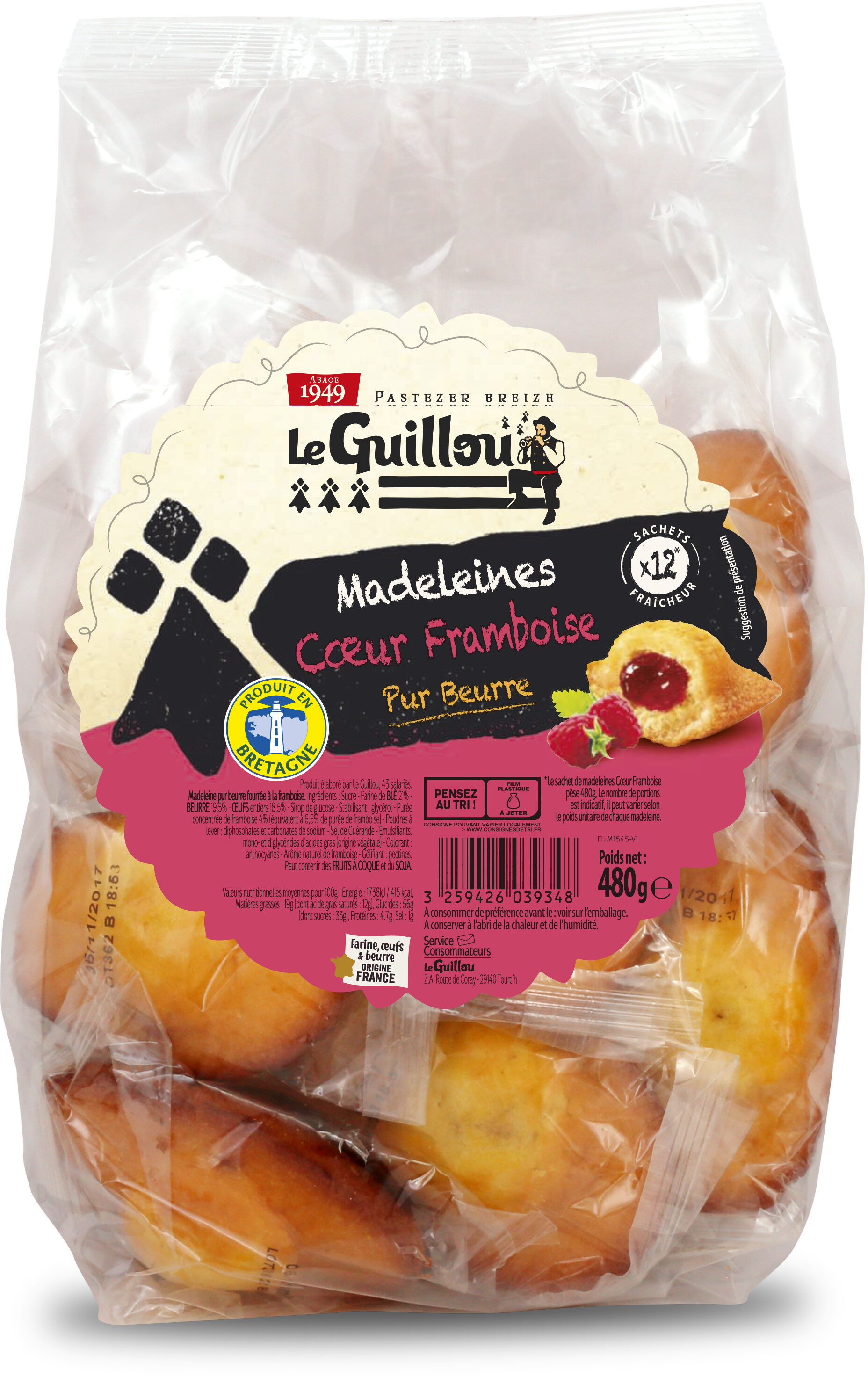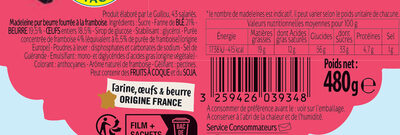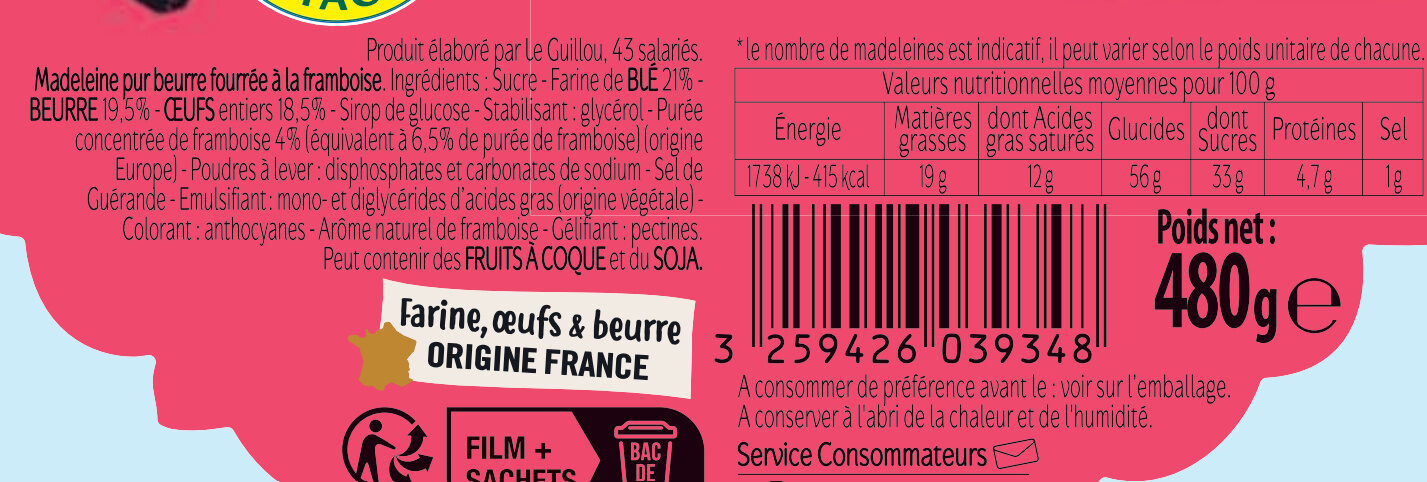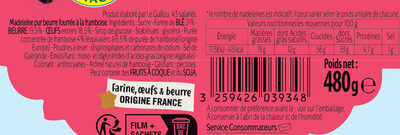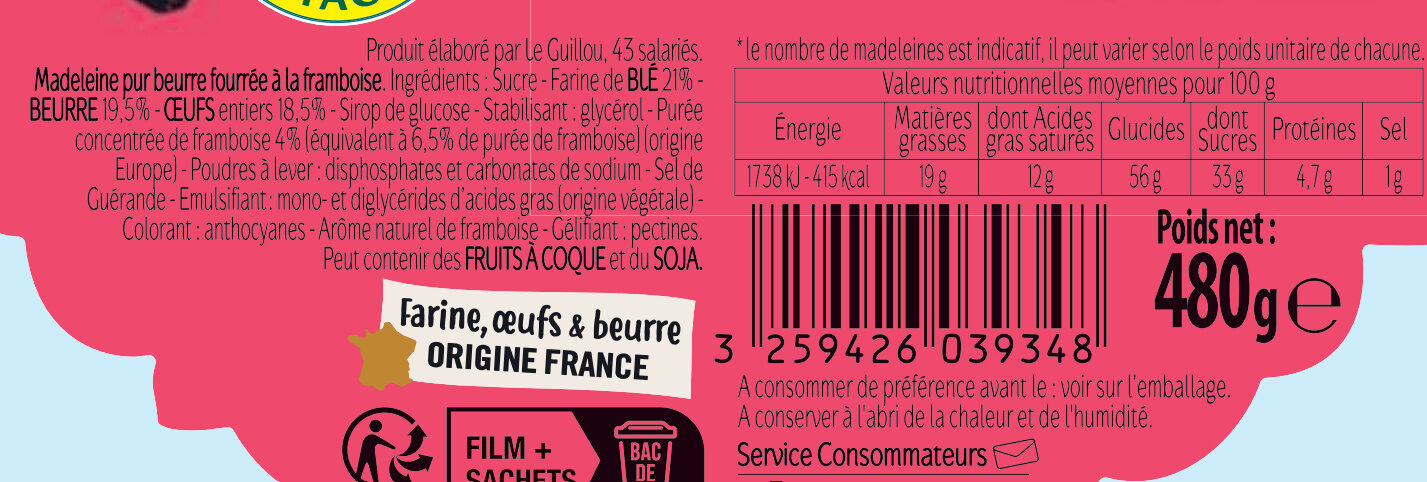Help us make food transparency the norm!
As a non-profit organization, we depend on your donations to continue informing consumers around the world about what they eat.
The food revolution starts with you!
Madeleines Coeur Framboise - Le Guillou - 480 g
Madeleines Coeur Framboise - Le Guillou - 480 g
Barcode: 3259426039348 (EAN / EAN-13)
Common name: Madeleines aux framboises
Quantity: 480 g
Packaging: Plastic, fr:Film en plastique
Brands: Le Guillou
Categories: Snacks, Sweet snacks, Biscuits and cakes, Cakes, Madeleines
Labels, certifications, awards: No palm oil, Produced in Brittany, Pure butter
Origin of the product and/or its ingredients: Fabriqué en France. Farine, oeufs et beurre français.
Origin of ingredients: France
Manufacturing or processing places: Bretagne
Link to the product page on the official site of the producer: https://www.leguillou.fr/
Stores: Carrefour market
Countries where sold: France
Matching with your preferences
Health
Ingredients
-
19 ingredients
French: Sucre - Farine de BLÉ 21% - BEURRE 19,5% - ŒUFS entiers 18,5% - Sirop de glucose - Stabilisant : glycérol - Purée concentrée de framboise 4% (équivalent à 6,5% de purée de framboise) - Poudres à lever : diphosphates et carbonates de sodium - Sel de Guérande - Emulsifiants : mono - et diglycérides d'acides gras - Colorant : anthocyanes - Arôme naturel de framboise - Gélifiant : pectinesAllergens: Eggs, Gluten, MilkTraces: Nuts, Soybeans
Food processing
-
Ultra processed foods
Elements that indicate the product is in the 4 - Ultra processed food and drink products group:
- Additive: E163 - Anthocyanins
- Additive: E422 - Glycerol
- Additive: E440 - Pectins
- Additive: E450 - Diphosphates
- Additive: E471 - Mono- and diglycerides of fatty acids
- Ingredient: Colour
- Ingredient: Emulsifier
- Ingredient: Flavouring
- Ingredient: Gelling agent
- Ingredient: Glucose
- Ingredient: Glucose syrup
Food products are classified into 4 groups according to their degree of processing:
- Unprocessed or minimally processed foods
- Processed culinary ingredients
- Processed foods
- Ultra processed foods
The determination of the group is based on the category of the product and on the ingredients it contains.
Additives
-
E163 - Anthocyanins
Anthocyanin: Anthocyanins -also anthocyans; from Greek: ἄνθος -anthos- "flower" and κυάνεος/κυανοῦς kyaneos/kyanous "dark blue"- are water-soluble vacuolar pigments that, depending on their pH, may appear red, purple, or blue. Food plants rich in anthocyanins include the blueberry, raspberry, black rice, and black soybean, among many others that are red, blue, purple, or black. Some of the colors of autumn leaves are derived from anthocyanins.Anthocyanins belong to a parent class of molecules called flavonoids synthesized via the phenylpropanoid pathway. They occur in all tissues of higher plants, including leaves, stems, roots, flowers, and fruits. Anthocyanins are derived from anthocyanidins by adding sugars. They are odorless and moderately astringent. Although approved to color foods and beverages in the European Union, anthocyanins are not approved for use as a food additive because they have not been verified as safe when used as food or supplement ingredients. There is no conclusive evidence anthocyanins have any effect on human biology or diseases.Source: Wikipedia
-
E422 - Glycerol
Glycerol: Glycerol -; also called glycerine or glycerin; see spelling differences- is a simple polyol compound. It is a colorless, odorless, viscous liquid that is sweet-tasting and non-toxic. The glycerol backbone is found in all lipids known as triglycerides. It is widely used in the food industry as a sweetener and humectant and in pharmaceutical formulations. Glycerol has three hydroxyl groups that are responsible for its solubility in water and its hygroscopic nature.Source: Wikipedia
-
E440 - Pectins
Pectins (E440) are natural carbohydrates, predominantly found in fruits, that act as gelling agents in the food industry, creating the desirable jelly-like texture in jams, jellies, and marmalades.
Pectins stabilize and thicken various food products, such as desserts, confectioneries, and beverages, ensuring a uniform consistency and quality.
Recognized as safe by various health authorities, pectins have been widely used without notable adverse effects when consumed in typical dietary amounts.
-
E450 - Diphosphates
Diphosphates (E450) are food additives often utilized to modify the texture of products, acting as leavening agents in baking and preventing the coagulation of canned food.
These salts can stabilize whipped cream and are also found in powdered products to maintain their flow properties. They are commonly present in baked goods, processed meats, and soft drinks.
Derived from phosphoric acid, they're part of our daily phosphate intake, which often surpasses recommended levels due to the prevalence of phosphates in processed foods and drinks.
Excessive phosphate consumption is linked to health issues, such as impaired kidney function and weakened bone health. Though diphosphates are generally regarded as safe when consumed within established acceptable daily intakes, it's imperative to monitor overall phosphate consumption to maintain optimal health.
-
E471 - Mono- and diglycerides of fatty acids
Mono- and diglycerides of fatty acids (E471), are food additives commonly used as emulsifiers in various processed foods.
These compounds consist of glycerol molecules linked to one or two fatty acid chains, which help stabilize and blend water and oil-based ingredients. E471 enhances the texture and shelf life of products like margarine, baked goods, and ice cream, ensuring a smooth and consistent texture.
It is generally considered safe for consumption within established regulatory limits.
-
E500 - Sodium carbonates
Sodium carbonates (E500) are compounds commonly used in food preparation as leavening agents, helping baked goods rise by releasing carbon dioxide when they interact with acids.
Often found in baking soda, they regulate the pH of food, preventing it from becoming too acidic or too alkaline. In the culinary world, sodium carbonates can also enhance the texture and structure of foods, such as noodles, by modifying the gluten network.
Generally recognized as safe, sodium carbonates are non-toxic when consumed in typical amounts found in food.
Ingredients analysis
-
May contain palm oil
Ingredients that may contain palm oil: E471
-
Non-vegan
Non-vegan ingredients: Butter, Whole egg
-
Maybe vegetarian
Ingredients that may not be vegetarian: E422, E471, Natural raspberry flavouring
-
Details of the analysis of the ingredients
fr: Sucre, Farine de BLÉ 21%, BEURRE 19.5%, ŒUFS entiers 18.5%, Sirop de glucose, Stabilisant (glycérol), de framboise 4% (), Poudres à lever (diphosphates de sodium), carbonates de sodium, Sel de Guérande, Emulsifiants (mono- et diglycérides d'acides gras), Colorant (anthocyanes), Arôme naturel de framboise, Gélifiant (pectines)- Sucre -> en:sugar - vegan: yes - vegetarian: yes - ciqual_proxy_food_code: 31016 - percent_min: 21 - percent_max: 29
- Farine de BLÉ -> en:wheat-flour - vegan: yes - vegetarian: yes - ciqual_proxy_food_code: 9410 - percent_min: 21 - percent: 21 - percent_max: 21
- BEURRE -> en:butter - vegan: no - vegetarian: yes - ciqual_proxy_food_code: 16400 - percent_min: 19.5 - percent: 19.5 - percent_max: 19.5
- ŒUFS entiers -> en:whole-egg - vegan: no - vegetarian: yes - ciqual_food_code: 22000 - percent_min: 18.5 - percent: 18.5 - percent_max: 18.5
- Sirop de glucose -> en:glucose-syrup - vegan: yes - vegetarian: yes - ciqual_proxy_food_code: 31016 - percent_min: 4 - percent_max: 12
- Stabilisant -> en:stabiliser - percent_min: 4 - percent_max: 8.875
- glycérol -> en:e422 - vegan: maybe - vegetarian: maybe - percent_min: 4 - percent_max: 8.875
- de framboise -> en:raspberry - vegan: yes - vegetarian: yes - ciqual_food_code: 13015 - percent_min: 4 - percent: 4 - percent_max: 0
- Poudres à lever -> en:raising-agent - percent_min: 0 - percent_max: 0
- diphosphates de sodium -> en:e450i - vegan: yes - vegetarian: yes - percent_min: 0 - percent_max: 0
- carbonates de sodium -> en:e500 - vegan: yes - vegetarian: yes - percent_min: 0 - percent_max: 0
- Sel de Guérande -> en:salt-from-guerande - vegan: yes - vegetarian: yes - ciqual_food_code: 11082 - percent_min: 0 - percent_max: 0
- Emulsifiants -> en:emulsifier - percent_min: 0 - percent_max: 0
- mono- et diglycérides d'acides gras -> en:e471 - vegan: maybe - vegetarian: maybe - from_palm_oil: maybe - percent_min: 0 - percent_max: 0
- Colorant -> en:colour - percent_min: 0 - percent_max: 0
- anthocyanes -> en:e163 - vegan: yes - vegetarian: yes - percent_min: 0 - percent_max: 0
- Arôme naturel de framboise -> en:natural-raspberry-flavouring - vegan: maybe - vegetarian: maybe - percent_min: 0 - percent_max: 0
- Gélifiant -> en:gelling-agent - percent_min: 0 - percent_max: 0
- pectines -> en:e440a - vegan: yes - vegetarian: yes - percent_min: 0 - percent_max: 0
Nutrition
-
Bad nutritional quality
⚠ ️Warning: the amount of fiber is not specified, their possible positive contribution to the grade could not be taken into account.⚠ ️Warning: the amount of fruits, vegetables and nuts is not specified on the label, it was estimated from the list of ingredients: 4This product is not considered a beverage for the calculation of the Nutri-Score.
Positive points: 0
- Proteins: 2 / 5 (value: 4.7, rounded value: 4.7)
- Fiber: 0 / 5 (value: 0, rounded value: 0)
- Fruits, vegetables, nuts, and colza/walnut/olive oils: 0 / 5 (value: 4, rounded value: 4)
Negative points: 26
- Energy: 5 / 10 (value: 1738, rounded value: 1738)
- Sugars: 7 / 10 (value: 33, rounded value: 33)
- Saturated fat: 10 / 10 (value: 12, rounded value: 12)
- Sodium: 4 / 10 (value: 400, rounded value: 400)
The points for proteins are not counted because the negative points are greater or equal to 11.
Nutritional score: (26 - 0)
Nutri-Score:
-
Nutrient levels
-
Fat in moderate quantity (19%)
What you need to know- A high consumption of fat, especially saturated fats, can raise cholesterol, which increases the risk of heart diseases.
Recommendation: Limit the consumption of fat and saturated fat- Choose products with lower fat and saturated fat content.
-
Saturated fat in high quantity (12%)
What you need to know- A high consumption of fat, especially saturated fats, can raise cholesterol, which increases the risk of heart diseases.
Recommendation: Limit the consumption of fat and saturated fat- Choose products with lower fat and saturated fat content.
-
Sugars in high quantity (33%)
What you need to know- A high consumption of sugar can cause weight gain and tooth decay. It also augments the risk of type 2 diabetes and cardio-vascular diseases.
Recommendation: Limit the consumption of sugar and sugary drinks- Sugary drinks (such as sodas, fruit beverages, and fruit juices and nectars) should be limited as much as possible (no more than 1 glass a day).
- Choose products with lower sugar content and reduce the consumption of products with added sugars.
-
Salt in moderate quantity (1%)
What you need to know- A high consumption of salt (or sodium) can cause raised blood pressure, which can increase the risk of heart disease and stroke.
- Many people who have high blood pressure do not know it, as there are often no symptoms.
- Most people consume too much salt (on average 9 to 12 grams per day), around twice the recommended maximum level of intake.
Recommendation: Limit the consumption of salt and salted food- Reduce the quantity of salt used when cooking, and don't salt again at the table.
- Limit the consumption of salty snacks and choose products with lower salt content.
-
-
Nutrition facts
Nutrition facts As sold
for 100 g / 100 mlAs sold
per serving (40 g)Compared to: Madeleines Energy 1,738 kj
(415 kcal)695 kj
(166 kcal)-6% Fat 19 g 7.6 g -18% Saturated fat 12 g 4.8 g +86% Carbohydrates 56 g 22.4 g +7% Sugars 33 g 13.2 g +21% Fiber ? ? Proteins 4.7 g 1.88 g -17% Salt 1 g 0.4 g +30% Fruits‚ vegetables‚ nuts and rapeseed‚ walnut and olive oils (estimate from ingredients list analysis) 4 % 4 %
Environment
-
Eco-Score B - Low environmental impact
⚠ ️Select a country in order to include the full impact of transportation.The Eco-Score is an experimental score that summarizes the environmental impacts of food products.→ The Eco-Score was initially developped for France and it is being extended to other European countries. The Eco-Score formula is subject to change as it is regularly improved to make it more precise and better suited to each country.Life cycle analysis
-
Average impact of products of the same category: B (Score: 78/100)
Category: Madeleine biscuit (cookie)
Category: Madeleine biscuit (cookie)
- PEF environmental score: 0.29 (the lower the score, the lower the impact)
- including impact on climate change: 1.95 kg CO2 eq/kg of product
Stage Impact Agriculture
71.9 %Processing
15.2 %Packaging
6.5 %Transportation
4.7 %Distribution
1.7 %Consumption
0.0 %
Bonuses and maluses
-
Origins of ingredients with a medium impact
Bonus: +4
Environmental policy: +4
Transportation: 0
Origin of the product and/or its ingredients % of ingredients Impact France 98 %Medium
-
Packaging with a medium impact
Malus: -11
Shape Material Recycling Impact 1 Film Plastic Discard High 12 Bag Plastic Discard High
Eco-Score for this product
-
Impact for this product: B (Score: 71/100)
Product: Madeleines Coeur Framboise - Le Guillou - 480 g
Life cycle analysis score: 78
Sum of bonuses and maluses: -7
Final score: 71/100
-
Carbon footprint
-
Equal to driving 1.0 km in a petrol car
195 g CO² per 100g of product
The carbon emission figure comes from ADEME's Agribalyse database, for the category: Madeleine biscuit (cookie) (Source: ADEME Agribalyse Database)
Stage Impact Agriculture
62.4 %Processing
13.6 %Packaging
14.8 %Transportation
8.2 %Distribution
1.0 %Consumption
0.0 %
Packaging
-
Packaging with a medium impact
-
Packaging parts
1 x Film (Plastic)
12 x Bag (Plastic)
-
Packaging materials
Material % Packaging weight Packaging weight per 100 g of product Plastic
-
Transportation
-
Origins of ingredients
Origins of ingredients with a medium impact
Origin of the product and/or its ingredients % of ingredients Impact France 98 %Medium
Report a problem
-
Incomplete or incorrect information?
Category, labels, ingredients, allergens, nutritional information, photos etc.
If the information does not match the information on the packaging, please complete or correct it. Open Food Facts is a collaborative database, and every contribution is useful for all.
Data sources
Product added on by kiliweb
Last edit of product page on by lisa123456789.
Product page also edited by alexouille, autorotate-bot, didierg, hya91, openfoodfacts-contributors, packbot, roboto-app, teolemon, yuka.Ui9BOUs2UXZpY2dBdFBBT3h3elo5SWx6Nkx6MlUyYUxKdklQSVE9PQ, yuka.ZUsxYU5LUUF2ZUZXdjhNKzJSWFd4TzVaN3JDamZFcVZJdkE4SUE9PQ, yuka.sY2b0xO6T85zoF3NwEKvlmNhedPDjxPmPg3UlkSh7OvQH7-4W84vz6_cKqs.
